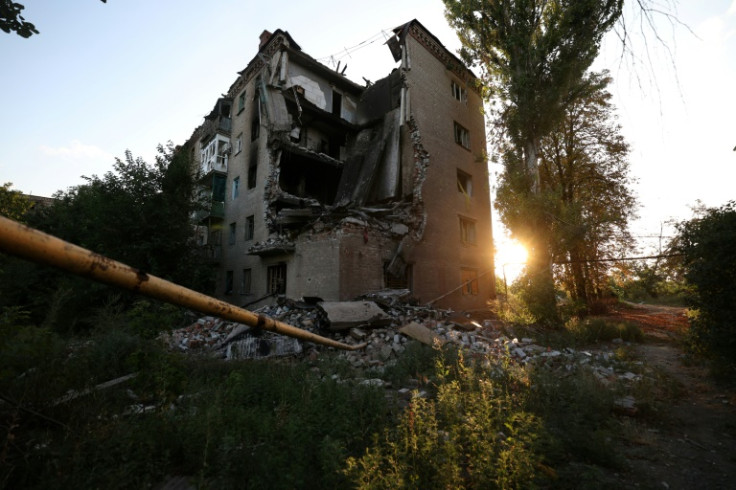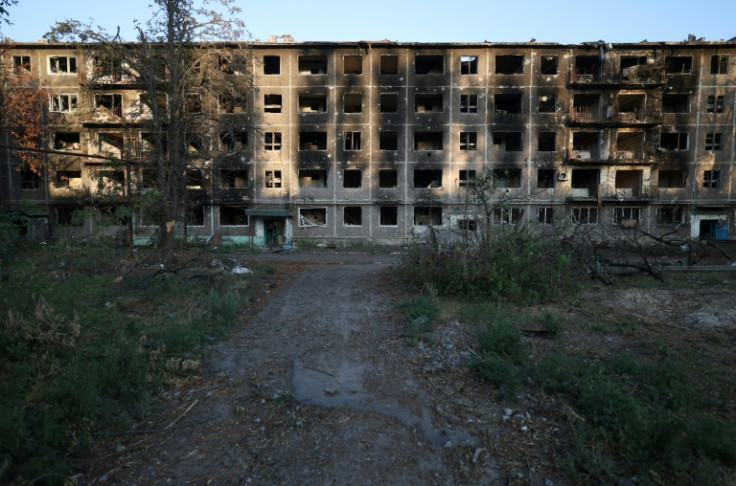
Once a vibrant industrial hub, Chasiv Yar in Ukraine's east has been transformed into a smouldering wreck of mostly deserted streets and empty buildings.
Before Russia's invasion, it was home to around 12,000 people, but is now largely abandoned save for soldiers and a small number of civilians.
Along roads strewn with debris and overgrown vegetation, AFP journalists could hear the frequent detonation of artillery and the buzz of a drone zipping across the sky.
"The current situation is difficult and tense," said Andrii, call-signed "Chip", a 29-year-old commander in Ukraine's 225th Separate Assault Battalion tasked with co-ordinating the drones.
"They are trying to overwhelm us with the number of infantry," he said.
The frontline town in the eastern Donetsk region has long been a target for Moscow as it seeks to progress towards the major city of Kramatorsk, some 20 kilometres (12 miles) away.
Staying outside for even a few seconds can be fatal.
But despite everything, "the Russians have not entered the city," Andrii told AFP.
In a dimly lit basement near the ruins of Chasiv Yar, Ukrainian army major Anwar pored over an array of computer screens showing a bird's-eye view of the battlefield.
"It's like a game of chess," said Anwar, his eyes fixated on footage beamed from the swarms of combat drones flying over the town.
As Moscow's troops close in on the town's suburbs, unleashing non-stop bombardment since April, outgunned Ukrainian troops have turned to the drones to slow their enemy's advance.
"Sometimes we have the advantage, sometimes they do, it all depends on the number of drones in the air," said Anwar, sitting in the basement that acts as a command centre.
But for Kyiv's army, which has suffered months of ammunition shortages and a critical lack of manpower, the drones have become a crucial line of defence.
Surrounding Anwar is a team of hand-picked specialists, to pilot and repair the swarm of drones and jam or hack into those belonging to the enemy.
Among them is Mykhailo, a 28-year-old former computer scientist nicknamed "Sempai" who can work "miracles with computers", according to Anwar.
"If you blow on them, they'll fall over. But they've killed more Russians than the most muscular commando," said Anwar of his comrades.
"The geeks are saving this country," he laughed.
Throughout the day Sempai and his colleagues are tasked with scanning live images, looking for a pile of pixels likely to be a Russian soldier or piece of equipment.
When a target is spotted, he issues orders to those on the ground, deciding whether to attack it with drones or artillery, based on what the cameras show.
"Sometimes I dream I'm flying, I can see our guys from the sky," Sempai explained, his hands glued to the keyboard.
"But it's always difficult," he said, trailing off into an awkward silence.
Faced with the daily horrors of war, Anwar admitted that the routine had "dulled his feelings" for the enemy and even his fellow soldiers.
He recalled when one of his pilots became upset after killing someone for the first time.
"I told him: 'No, you've killed an asshole', and then he took a step back," he said.
In the long run, some of his men feel that killing via the screens is "like a game", he said, staring into space when remembering the death of one of his colleagues.
He said he was sad at first, but that this feeling had now given way to revenge.
"Now the tears have gone," he told AFP.









